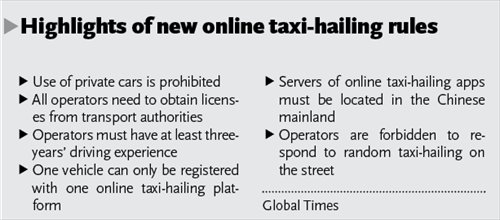Plan likely to drive away operators, seen as setback

China's plan to ban the use of private cars in online car-hailing services will deal a heavy blow to China's online taxi industry, affecting major companies such as Didi Kuaidi and Uber, analysts said Sunday.
China's Ministry of Transport on Saturday released a draft regulation on car-booking services that requires online taxi-hailing operators to obtain licenses from transport authorities. It stipulates that all related servers must be located in the Chinese mainland and be subject to supervision from Chinese authorities.
The new regulations will address the problem that the online car-hailing model had "disrupted normal market order, which has affected the taxi industry and social stability," authorities said.
The regulation, which is open for public comment for a month, states that all private cars must be registered as a "taxi" before they can be used for online car-hailing. This means that the cars will have to be scrapped after about eight years of service.
Drivers will also be required to meet certain qualifications such as driving experience, a certificate and a labor contract with an online taxi-hailing platform. Besides, they are banned from using more than one platform at once and cannot pick up passengers that hail them from the street.
According to the draft, car-hailing service operators should not be in a dominant position in any place they offer services and must not hinder fair market competition.
A communication officer from China's online taxi-hailing company Didi Kuaidi, surnamed Zhou, told the Global Times on Sunday that it will "responsibly convey its opinions and suggestions for modifications" [to the government] after consulting experts, industry companions and a broad number of Didi Kuaidi drivers.
Uber China, for its part, told the Beijing-based finance magazine Caixin on Saturday that it will carefully study the regulation and "actively participate in the formulation of the regulation."
More hassle
Many private drivers said they are considering quitting the business as the new regulation would create more hassle for them than benefit.
Yin Hao, a Jiangsu-based car rental agent who currently has over 800 private car owners on his books for his online taxi business, told the Global Times that the draft would greatly affect his business.
"Once the draft is settled, many of the drivers will not want to re-register their cars for commercial purposes," he said.
Many experts believe that the regulation does not meet the market's requirements, which may restrict the rapid development of the sector.
Wang Jun, an associate professor from the China University of Political Science and Law, told news website caixin.com that the draft regulation is merely expanding types and numbers of taxis based on the original taxi management system. The biggest advantage of this service lies in mobilizing large numbers of non-commercial vehicles to realize the sharing-economy idea.
However, the draft fails to fulfill the idea and managing a new sector in an old-fashioned way will limit the development of this business.
Wang's opinion was echoed by Gu Dasong, an associate professor of transport laws at Southeast University, who told the Global Times that the draft seems to turn Internet companies into secondary taxi firms. He suggested that private cars be better utilized to meet the demand for public transportation and transport regulations should be decided by local governments based on their unique situations.
On Thursday, Didi Kuaidi was licensed by the Shanghai Municipal Transport Commission to offer private-car booking services. The Shanghai municipal government said it will grant car-booking licenses for companies that meet the criteria, including making data accessible to regulators, Chinese mainland-located servers, and careful screening of both vehicles and drivers.
However, Wang Limei, vice president of the China Road Transport Association, an NGO with the mission to promote road transport in China, argued that the draft will legalize and better regulate this new business.
"For public transportation, drivers and providers must observe the rules of this industry," Wang told the Global Times.


















































